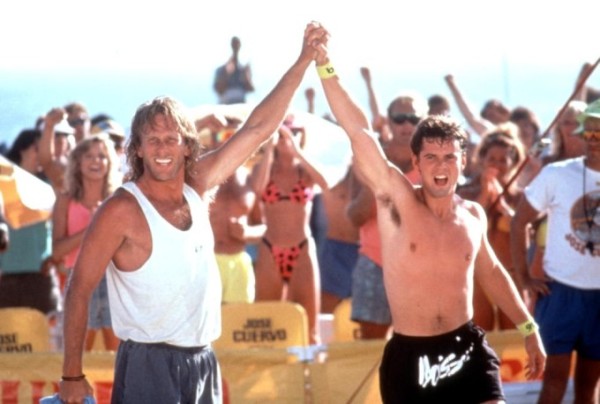So a few months ago this writer wrote into me hyping up his TV pilot. Without getting too specific, it was about a future world in the mold of that new show “Humans” on AMC – the “A.I.” like show about robots being used as slaves. Hearing the writer discuss his script, I don’t think I’d ever been more excited to read something. Not only was it a cool idea, it tackled intense themes like mortality and survival and the power of family. It sounded really good.
And then I read it.
And the script was… not what I had been told it was. It was just so damn… cheesy. There’s no other way to put it. It was a freaking cheese-fest. Like it needed its own display in a Wisconsin supermarket.
But I’m not just an observer at the corner of Swiss and Gouda. I’m a client. I once wrote a tennis script that I thought was going to change tennis forever. It was this deep intense look at a troubled doubles team scraping by on the tour. I gave it to a producer and he didn’t really respond to it. When I pressed him for details on why, he said it reminded him of “that movie Side Out.” I’d never heard of that movie so I looked it up. Here’s the still that I found.
Ouch.
That was not what I was going for AT ALL. But it shows just how pervasive this problem is. And why everyone fears it. I mean, I think we’re all trying to avoid making the next Side Out. James Gunn, the writer-director of Guardians of the Galaxy, had a mini-breakdown in the middle of shooting that film when he became convinced he was making the next Pluto Nash.
Point being, I run into this problem a lot. Writers who go for these really intense dramatic stories that end up coming off super-cheesy. And they don’t know it. And the question becomes, how do you recognize this and fix it before you send your script out and embarrass yourself?
So I got to thinking about that question: What makes a show/movie cheesy? And I came up with a handful of observations. Now to understand what I mean by cheesy, we’re going to look at both extremes, intense drama and cheeseapocalypse. On the “non-cheesy” side, you have something like the Todd Field film, “In the Bedroom.” Here’s a clip from that movie.
As long as we’re talking about rooms, why don’t we hop into an adjacent room for what some consider to be the cheesiest movie of all time. Here’s a scene from, “The Room.”
Now here’s the scary part. Tommy Wiseau, the director of “The Room,” was trying to make a movie like In the Bedroom – something with that kind of power, with that kind of gravitas. What went wrong? That’s an article for another day. But the cheese-factor here can be attributed to a few things, as can most unintentionally cheesy efforts.
1) False Reality – “False Reality” is when you move away from how characters would act in real life and start substituting actions that work specifically for your movie. So if you look at this scene from The Room, Tommy Wiseau reasoned that he needed this scene for his plot. But a big reason why it feels so cheesy is because the scene would never happen in real life. A guy doesn’t sit down on a roof and immediately start talking to someone about girls cheating then leave. Nothing about it feels honest and therefore it screams, “False Reality.” Everything in In The Bedroom’s scene feels honest, like this is the way it would really go down. That authenticity is what wards off the cheesiness.
2) Bad dialogue – The words “cheesy” and “dialogue” go together like peanut butter and jelly. That’s how easy it is to write cheesy dialogue. To avoid this age-old trap, apply the same “false reality” logic to your dialogue as you would your scenes. Ask the question, “Would the characters really be saying this?” Because a lot of times as a writer, you make characters say things in order to move your plot forward or to slip in your observations about life. But you don’t stop to consider if that’s what they’d say in the real world. Now the conversations are never going to sound exactly the same, of course. You have to abbreviate movie-conversations to keep the story moving. But the essence of what they’re saying needs to be necessary. It needs to be truthful. And it needs to be believable. That’s what you need to nail. Also, avoid on-the-nose dialogue at all costs. People rarely say exactly what they’re thinking so when they do, it draws attention to itself, and cheesiness is a by-product of that. So Tommy Wiseau saying, “I’m so happy I have you as my best friend and I love Lisa so much.” Nobody says that kind of thing. That’s why the line is so cheesy.
3) Two-dimensional characters – This one isn’t as easy to spot because it’s less about what’s happening in the moment and more about how much time you put into constructing your characters. The less you know about a character, the more likely it is that they’ll respond to situations in a generic manner. And “generic” is cheese-fuel. Have you ever known someone who speaks in generalities and catch-phrases? “You working hard or hardly working, John?” “That’s my story and I’m sticking to it.” “Looks like somebody’s got a case of the Mondays.” They come off as cheesy right? It’s because they have no depth. Everything they say is surface-level. An act. The same thing goes for your characters. The better you know them, the more specifically you’ll have them act, which in turn makes them more authentic, which is the opposite of cheesy. So write out those extensive backstories, give your characters unique ways of speaking, create complicated relationships for them, give them goals in life, give them unique hobbies, weird stuff they’re infatuated with. Give them that flaw that holds them back. Make sure that flaw dictates everything they do. Make them specific!
4) Stay consistent with your tone – In military parlance, there’s an old saying: “Hold the line.” It’s when you’re shoulder to shoulder in the trenches with your army, shooting down the approaching enemy. Your job is to make sure those guys don’t get past your line. Tonal consistency is a similar idea. You choose a tone for your story and you try and stick to it. The problem is, you get all these goofy, funny, or weird ideas you want to add (the approaching enemy soldiers), and you’re so tempted to just duck down and let them through. You can’t. You’ve chosen this tone so you have you to stick with it. I can’t take your dark funeral drama seriously if one character’s farting all the time. I can’t take your blood diamond action film seriously if one character cracks wise every time he gets in a fight. I can’t take your Leaving Las Vegas type romantic drama seriously if you include the animal cracker scene from Armageddon. Whatever your tone is, hold the line until you get to “The End.”
Like a lot of things in screenwriting, avoiding the cheese tag comes down to truth. If you convey your story and characters and dialogue in a way that feels truthful, we’ll surrender to your world. But if characters are constantly doing things or saying things that they’d never say or do in that situation (or in real life), that’s when shit starts feeling like a big ball of Velveeta. And with that, I leave you with a challenge. Here’s a scene from the zombie show “Z Nation,” which I consider to be really cheesy. I want you to tell me WHY this scene is cheesy. In doing so, consider the show’s polar opposite – “The Walking Dead.” How would THEY have done this scene? Feel free to add your own reasons beyond the four I’ve brought up. The more cheesy rules we end up with by the end of the day, the better.



